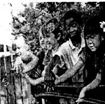题目内容
9.would rather宁愿,宁可.分析 宁愿,宁可
解答 答案:宁愿,宁可.
本题是对短识记能力的考查,题目较简单.故答案为宁愿,宁可.
点评 would rather的用法
1、would rather意思是"宁愿、宁可、最好、还是为好",后接动词原形,常省略为'd rather,表示优先选择的一种方式
其否定形式是would rather not do sth.would rather没有人称和数的变化,所有的人称一律用would rather.
例If you'd rather be alone,we'll all leave here.如果你宁愿独自呆着,那我们都离开这儿.
2、如果在两者中进行取舍,表示"宁愿…而不愿…,与其…宁可…"的意思时,则可用would rather…than…或would…rather than…的句型
例 I would rather watch TV at home than go to the cinema.我宁可在家看电视而不愿去看电影.
3、would rather+从句,是一个常用的虚拟语气句型 Would rather+从句,谓语一般用过去时来表示现在或将来.其意为"宁愿…,还是…好些""一个人宁愿另一个人做某事".引导从句的that常省略.在谈到过去的动作时,谓语则用过去完成时.
例 John wants to see me today.I would rather he came to tomorrow than today.约翰今天想去看我.我宁愿他明天来看我而不是今天.(句中came不是表示过去而是表示将来)
We'd rather he paid us the money tomorrow.我们宁愿他明天付给我们那笔钱.
Don't come tomorrow.I'd rather you came next weekend.明天别来.我希望你下周末来.

The last birth order position is only children.With no brothers or sisters they often(49)A
whatever they want!They don't have any (50)Dfor their parents'time or resources.Only children often use language very well(51)Bthey spend so much time with adults.They can also feel a lot of (52)Bas only children,which can make them competitive and hardworking.
Some people (53)Dthat birth order theory describes them very well.Other people say the theory doesn't (54)A.There are many other different(55)B that may change the effects of birth order on personality.These variables(56)Cthe sex and age of each child and the number of brothers and sisters.Culture and education(57)Bmake a difference.So does the amount of money that the(58)Dhas.The experiences of the family can also change how birth order affects (59)C
As family expert Frank Sulloway says,"Humans are complex.But that doesn't mean birth order isn't (60)C
we can learn from."
| 41.A.middle | B.last | C.small | D.cute |
| 42.A.beyond | B.under | C.with | D.for |
| 43.A.become | B.need | C.accept | D.see |
| 44.A.new | B.different | C.strange | D.right |
| 45.A.perfect | B.honest | C.polite | D.curious |
| 46.A.concerned | B.cautious | C.excited | D.disappointed |
| 47.A.results | B.promises | C.advantages | D.dreams |
| 48.A.And | B.So | C.But | D.Or |
| 49.A.get | B.ignore | C.hide | D.doubt |
| 50.A.preparation | B.excuse | C.authority | D.competition |
| 51.A.until | B.because | C.unless | D.though |
| 52.A.sadness | B.pressure | C.pity | D.pain |
| 53.A.advise | B.hope | C.know | D.find |
| 54.A.work | B.happen | C.appear | D.develop |
| 55.A.forms | B.situations | C.standards | D.purposes |
| 56.A.influence | B.change | C.include | D.describe |
| 57.A.seldom | B.also | C.never | D.ever |
| 58.A.team | B.society | C.school | D.family |
| 59.A.emotion | B.attitude | C.personality | D.behavior |
| 60.A.anything | B.nothing | C.something | D.everything. |
| A. | let out | B. | give up | C. | leave out | D. | set off |
 From a very early age,some children exhibit better self-control than others.Now,a new study that began with about 1,000children in New Zealand has tracked how a child's low self-control can predict poor health,money troubles and even a criminal record in their adult years.
From a very early age,some children exhibit better self-control than others.Now,a new study that began with about 1,000children in New Zealand has tracked how a child's low self-control can predict poor health,money troubles and even a criminal record in their adult years.